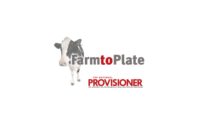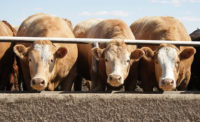Climate change poses a serious threat to the world and its inhabitants — both people and animals.
Producers are often a target for blame. Why? Because some activists want an easy scapegoat for a complicated problem.
But farmers aren’t part of the problem; they’re a vital component of the solution. And as producers across the country commit to growing crops and raising livestock in a sustainable manner, it’s important to remember the welfare of animals on our nation’s farms and ranches.
Recently, I had the opportunity to speak at a conference in Chicago that was hosted by the Sustainable Agriculture Initiative. We discussed resilient agriculture, how producers can re-orient their practices to mitigate damage to the environment and build a more sustainable future.
After interacting, learning and sharing with farmers, researchers and industry professionals, I left more confident than ever in our ability to share a greener tomorrow.
Around the world, producers are recognizing the threat of climate change. The likelihood of extreme weather events is on the rise — heat waves, hurricanes, droughts and floods are all increasing in regularity and intensity. These make it increasingly difficult for farmers to sustain their livelihoods and supply food consumers need.
According to a report from the United Nations’ Intergovernmental Panel on Climate Change, large swathes of the world will suffer from decreased crop yields if global warming reaches 1.5 degrees Celsius above pre-industrial levels. If the world warms 2 degrees Celsius, up to 396 million people will be exposed to lower food yields. As yields suffer, food insecurity will spread in tandem with higher prices at markets and grocery stores.
Producers are acknowledging these challenges and meeting them head on. They can do that while prioritizing animal welfare.
At the organization I lead, American Humane, we believe animal welfare and sustainable agriculture can go hand and hand. And we have firsthand experience witnessing producers excel at both through our American Humane Certified program, the nation’s largest third-party animal welfare auditing program.
Consider Just BARE chicken, a producer we certify. Since 2015, its parent company, Pilgrim’s Pride, has reduced the company’s natural gas use intensity by 11.2 percent, electricity use intensity by 6.2 percent and greenhouse gas use intensity by 9 percent. And along the way, they’re committing to humane welfare standards set by an independent third party.
Some detractors question the role of poultry and livestock as food sources of the future. Editorials have fawned over the advent of cultured, or lab-grown, meat. It’s being marketed as a solution to agriculture’s impact on the environment.
But a recently released Oxford study shows lab-grown meat may be worse for the environment than livestock or poultry, depending on consumption pathways and how the meat is produced. That’s because growing meat in a factory may produce only carbon dioxide, which will stay in the atmosphere for thousands of years. While raising livestock produces carbon dioxide, it also produces methane and nitrous oxide.
Methane only stays in the atmosphere for about 12 years, and if production remains stable, it reaches an equilibrium. That’s much better for the environment than the copious amounts of carbon dioxide that cultured meat could produce.
Instead of trying to pursue implausible solutions, I believe we should re-invest in our farmers and producers. Moving forward, producers should work, like Pilgrim’s Pride is doing, to reduce their footprints while still providing nutritious, affordable food that is raised humanely and certified by a third party. NP





Report Abusive Comment